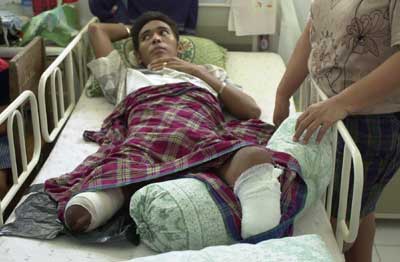
WARNING: The following account contains several graphic testimonies of atrocities committed against Christian villagers in Indonesia’s Maluku Islands. We are reporting them because the Christians there are appealing to the world to respond to their plight.
JAKARTA, Indonesia (BP)–It’s a strange feeling to talk to someone and know — I mean, to be almost sure — that he will be dead in a few days, if not sooner.
He looked to be about 15 years old. He tried to keep a stern, defiant glare on his face as he showed off his weapons of war: a quiver of homemade arrows tipped with rusty nails, cardboard for the feathers.
As tough as he tried to appear, his eyes gave away his fear. I wanted to grab him and say: “You know you’re not going on a turkey-shoot, don’t you? These are people with guns, and they’re shooting back.” But by the look in his eyes, I’m pretty sure he understood that.
We had been in Ambon, the seat of Indonesia’s Spice Islands, for a week. Traveling as a team of photographer, videographer and writer, we were searching for the truth behind the clashes between Muslims and Christians in the Maluku Islands, which have been raging for nearly two years.
It’s difficult — impossible, really — to prepare oneself for this type of task. Why have hundreds of people been killed in the name of religion? Why does it continue? And why do so many deny that the root of the conflict is politics, not God?
The testimonies of the Ambonese staggered us. Each had individual stories, and each made me question my own strength.
Take Daniel, an aging man who had walked for nearly five days across a mountain to reach a safe site, eating only two bananas during his whole trek. In Daniel’s home village, attackers had dug up his mother, who had recently died. In an act meant to intimidate and torture even in death, her body was pierced with spears and left out in the open.
Yulianus watched from the forest as his pregnant niece was captured. After slitting her throat, the attackers cut her unborn child from her womb, chopped it to pieces and put it on skewers. The sticks were stuck into a tree in the middle of the burning village.
Both men told me they thank God for sparing them and say they pray for God’s mercy on this island. Their eyes conveyed sorrow, but no hate could be detected.
On Sept. 25, as we packed to leave the next day, we were told by an Indonesian friend that Muslims were planning to attack Ambon City the following morning — a tactic meant to disrupt the Christian community’s week of prayer, fasting and work stoppage to protest the killings.
Morning came with no attack on the city. But three bombs had exploded during the night –one just two blocks from our hotel. From the hotel roof, however, we watched as the alternative site was destroyed. Across the bay from Ambon City, a mile-wide swath of smoke rose heavenward from the village of Hative Besar. Our hearts fell, as this was also the destination where our speedboat was to land to get us to the airport.
In the hills several miles behind us, cannon fire could be heard — military artillery pinning Christian fighters in the mountains, preventing them from lending assistance to the hapless villagers.
Knowing the fighting would grow over the next few days, we knew we had to at least try to make it out. Ambonese church members drove us to a safe part of the beach. We weaved through town in a van used to transport criminals — hoping that this would deter sniper fire.
At the beach, we were greeted by hundreds of refugees who had fled across the bay from the attacks. Many were in shock — crying and wailing — separated from family members. Others carried the wounded. Many pleaded to us for help, asking why the world was ignoring them. Men asked us to stay and fight with them.
“We’ll do you more good by leaving, so we can tell this story to the world,” I told them. I felt weak and useless saying that, knowing many would not last to see assistance — if it ever comes.
Crossing the bay on a boat heading to pick up more refugees, we kept a watchful eye out, feeling tense and vulnerable on the open water. The day we arrived in Ambon a week before, a boat filled with 80 people had come under attack; two were killed and 18 seriously wounded.
Men and boys were congregating in the road by the beach when we landed, grouping to walk up the road and defend other villages against the forces of Muslim “jihad” warriors — warriors armed with automatic weapons, mortars, grenades and other advanced weaponry.
As the men, armed with a handful of homemade guns, machetes (along with a scared teenager with a bundle of ragtag arrows on his back) gathered to pray before going, the questions still swirled in my mind after a week: “What is going on here? Why are these people getting slaughtered? What is it going to take to stop the violence?”
The sovereignty of God is something that must be surrendered to, I concluded, as the week caught up to us in this graphic picture. Along with the rest of the team, I sobbed as we made our way to the airport. Pray for the people of Ambon.
–30-
(BP) photos posted in the BP Photo Library at www.sbcbaptistpress.org. Photo titles: THANKFUL TO BE ALIVE, WHY?, CRY OF THE PEOPLE and REFUGEE WAREHOUSE.

















